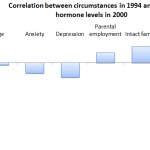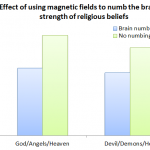You young ‘uns may not remember the dark days of 1999, when the imminent arrival of the millennium was met with a fair degree of fear and trepidation.
And it wasn’t just your usual end-times hysteria. There was actually some real concern that a software bug – the infamous Y2K bug – a could cause all sorts of problems with the software running vital systems.
In the dying days of 1999, a survey was undertaken of people’s perceptions and beliefs around the Y2K bug. Over 1,200 people took part, recruited from a bunch of different places – the online experiment pages of several psychological societies, university websites, Yahoo (remember Yahoo!?), and Y2K relevant websites.
As well as their perceptions of the Y2K bug they were also asked about their perceptions of the government and whether they believed a range of popular conspiracy beliefs (e.g., about the Kennedy assassination, about the cover-up of evidence for the existence of extraterrestrial life, whether OJ Simpson was framed, whether the USA government is supplying illicit drugs to inner city communities, and whether the Japanese are conspiring to destroy the American economy).
This survey was recently re-analysed by Jan-Willem van Prooijen (Netherlands Institute for the Study of Crime and Law Enforcement) and Michele Acker (Otterbein University, Westerville, USA). They were particularly interested in one question that was asked: “To what extent do you think you can personally control negative consequences due to the Y2K situation?”
What they found was that people who felt that they could not personally control any untoward effects of the Y2K bug were also more likely to believe all the different conspiracy theories.
That held true after adjusting statistically for age, gender, education level, and political orientation (one interesting finding was that both political left and right believed in conspiracies – they just believe in different ones!).
It also held true after adjusting for trust in government (people who trust the government are less likely to believe in conspiracy theories) and, crucially, for belief that the Y2K bug itself was a conspiracy (apparently, some people thought that computer programmers had introduced the bug deliberately to keep themselves in permanent employment!).
So, even when you take into account that some people thought that Y2K was itself a conspiracy, those who felt not in control of the threat were more likely to believe in a host of conspiracy theories.
This fits with a large body of other evidence which suggests that when people feel out of control, they double-down on their efforts to make sense of the world around them. Often times that can mean seeing patterns that aren’t really there
So what has this got to do with religion?
Well, there’s a lot of evidence that believers in the paranormal tend to see patterns that aren’t really there. And there’s some evidence that religion can act to reduce the anxiety related with feelings of loss of control (see: the merry-go round between uncertainty, error detection and religion).
But these effects have never really been shown outside of small lab studies. The Y2K bug offered a fantastic opportunity to see this effect at work in the real world, so we have to be glad for van Prooijen and Acker’s analysis.
Now, you may have been wondering why we’re seeing this analysis now, some 15 years after the event. Well, apparently these survey data have been sitting in a back-room filing cabinet somewhere, unpublished.
I’m sure there’s some perfectly reasonable explanation for that that doesn’t involve the Illuminati, but I’m struggling to think what that might be!
![]() van Prooijen, J., & Acker, M. (2015). The Influence of Control on Belief in Conspiracy Theories: Conceptual and Applied Extensions Applied Cognitive Psychology, 29 (5), 753-761 DOI: 10.1002/acp.3161
van Prooijen, J., & Acker, M. (2015). The Influence of Control on Belief in Conspiracy Theories: Conceptual and Applied Extensions Applied Cognitive Psychology, 29 (5), 753-761 DOI: 10.1002/acp.3161















